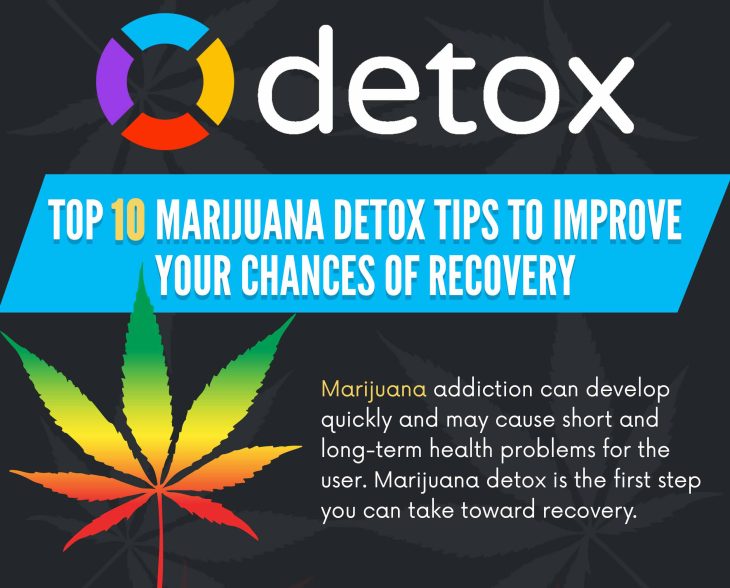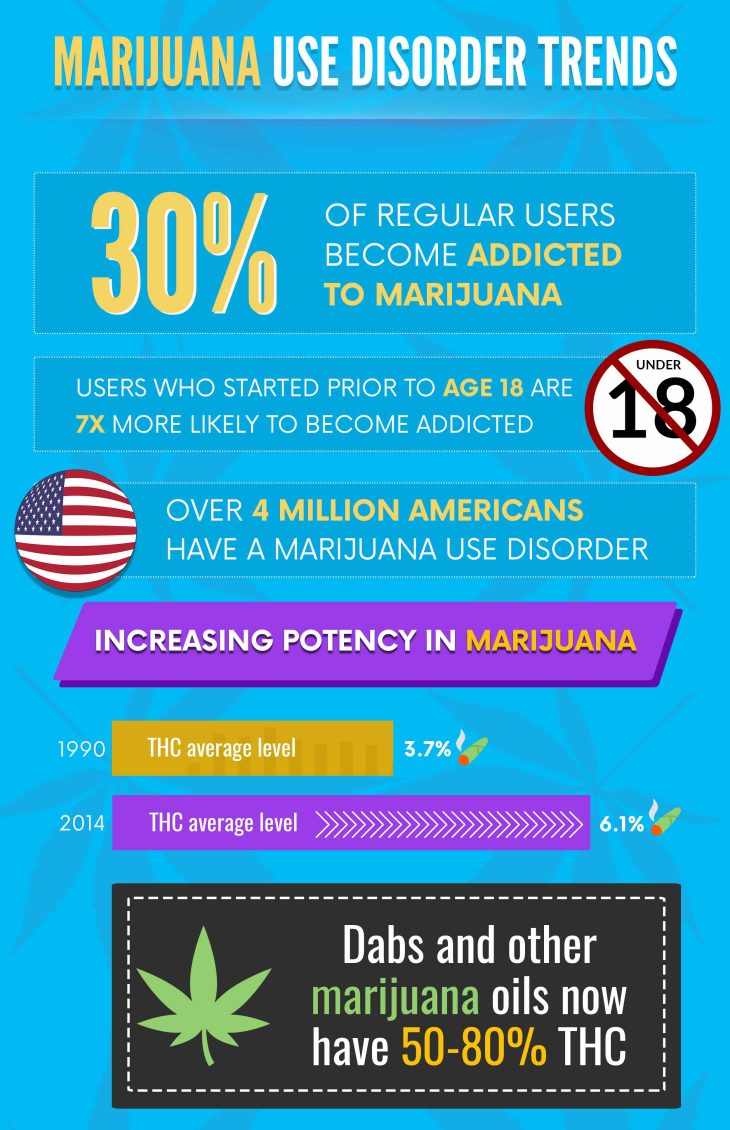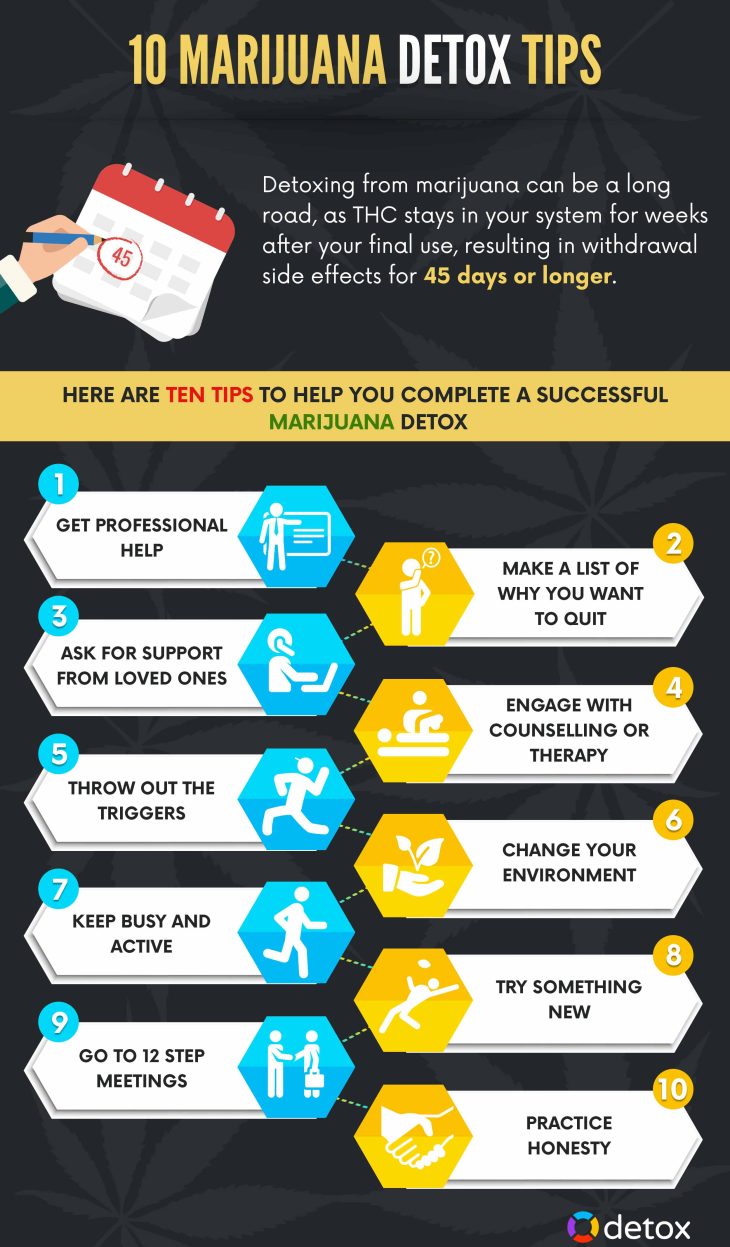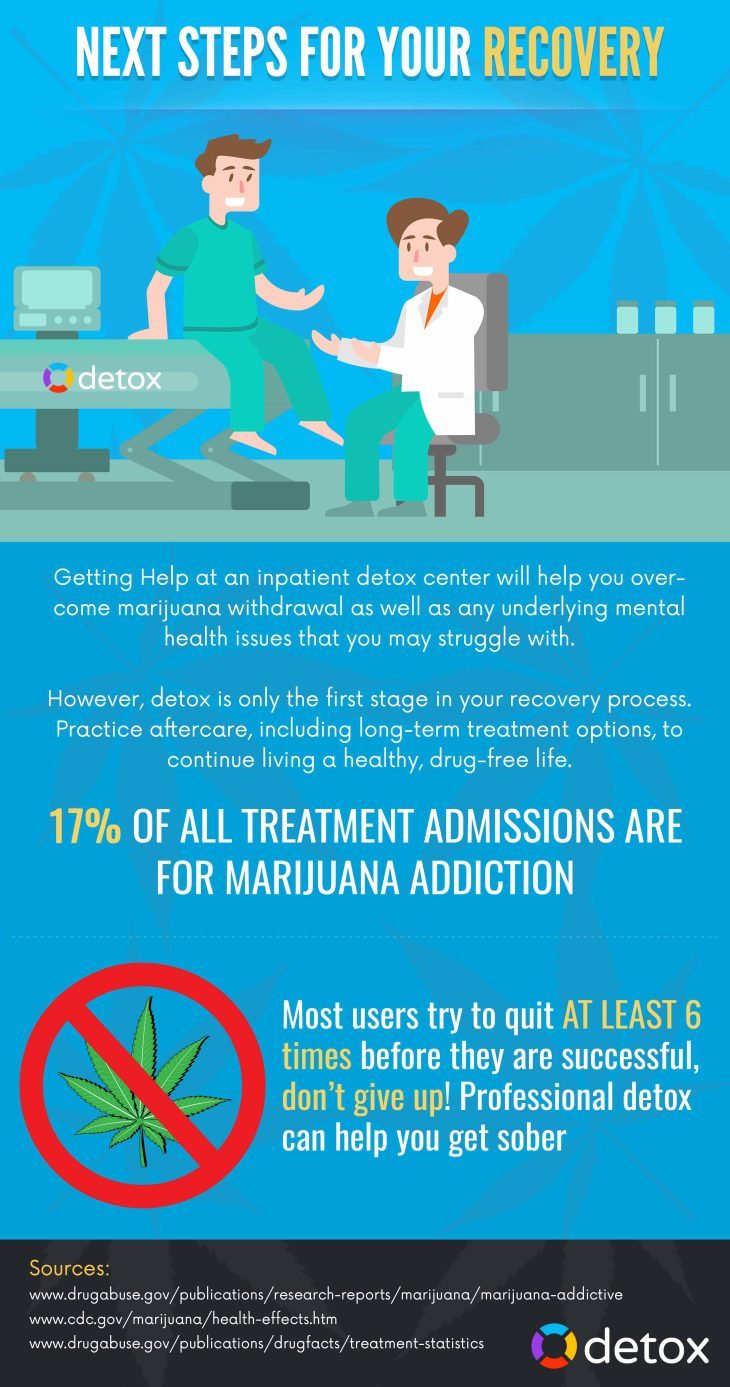10 Improved Marijuana Detox Tips to Help Your Recovery
If you are struggling with a marijuana use disorder, the first step in overcoming addiction is to undergo marijuana detox. Although marijuana detox symptoms are not dangerous, you’ll be better off seeking help from a professional treatment program that has the resources and tools to help you get and stay clean, rather than attempting to recover alone.

Marijuana Use Disorders in the United States
Studies have shown that marijuana use leads to addiction in 30% of regular users.
If you start using marijuana before age 18, you have seven times the chance of developing a problem. In 2015, approximately four million Americans met the criteria for marijuana use disorder, but only 138,000 voluntarily underwent treatment for their addiction.
Yes, Marijuana is Addictive, and Here’s Why
Repeated marijuana use changes your brain’s chemistry and structure. In response to the artificial stimulation of neurotransmitters—the phenomenon that creates the “high” users feel—your brain will reduce the amounts of neurotransmitters produced while also decreasing its sensitivity to those neurotransmitters. This creates a tolerance, which requires users to increase their marijuana usage, which in turn causes the brain to further reduce neurotransmitters, which further increases tolerance. This continuing cycle results in the individual no longer using to feel euphoric, but to simply feel well enough to accomplish daily tasks.
Rising Potency
The levels of THC in marijuana have been increasing over the past few decades. Most confiscated marijuana in the early 90s had an average of 3.7% THC. By 2014, that average rose to 6.1%. In addition, new methods of THC extraction have produced oils that have between 50 and 80% THC. The higher the levels of THC you ingest, the more powerful the effects on the brain will be, and the more addictive the substance becomes. In addition, varying potency makes it difficult for you to regulate your dose, which could lead you straight to the emergency room.

Marijuana Withdrawal
Acute marijuana detox symptoms begin as soon as a few hours after the last use, peak during the first week, and last, on average, for two weeks. The psychological symptoms of marijuana withdrawal are much more common, and more troublesome, than the physical symptoms, which include:
- Fever, sweating, and chills
- Headache
- Tremor
- Stomach pain
- Nausea
- Reduced appetite
- Fatigue
Psychological symptoms include:
- Insomnia
- Depression
- Anxiety
- Irritability
- Restlessness
- Mood swings
Signs You Need a Marijuana Detox Program
Marijuana addiction is a problem that requires professional treatment to manage. You are addicted to marijuana if you are unable to quit using despite suffering negative consequences from your drug use.
Other signs to look out for:
- Increased tolerance
- Needing to use to cope with everyday activities
- Using marijuana to escape emotions and avoid your life
- Experiencing withdrawal symptoms when you try to quit
- Skipping activities and social events in order to use
- Isolating yourself from family and friends
- Experiencing declining performance at school or work
- Problems with concentration and memory
- Constantly thinking about using, or maintaining your supply
- Hiding or lying about your marijuana use
Contact Detox.com now to find marijuana detox programs near you!
The Benefits of a Marijuana Detox Program
Although marijuana detox symptoms are not dangerous, a medically-supervised detoxification can still be very helpful—or essential, if the marijuana use is frequently accompanied by other substances, such as alcohol or benzodiazepines, which can make withdrawal symptoms much more severe.
Marijuana withdrawal also has the potential to last for a very long time, because THC, the primary chemical that causes the drug’s psychoactive effects, remains in the body for several weeks after use. Studies have shown that many individuals recovering from marijuana use disorder suffer from sleep disturbances such as disturbingly vivid dreams for 45 days or longer. Some recovering users experience symptoms for months after quitting marijuana.
Although there is no medication that is specifically FDA-approved for marijuana detox or marijuana addiction treatment, there are antidepressants, anti-anxiety drugs, and other medications that can make the process of detox and recovery much easier. Remaining in treatment at a rehabilitation center even after detox will give you the best chance of continuing to live drug-free.
Treatment at many medical detox centers also provides dual-diagnosis treatment, which will identify if you have any additional mental or behavioral health issues that also need to be addressed. You may have turned to marijuana as a way of self-medicating these problems, which may rebound worse than before in the wake of marijuana detox. Professional treatment will take care of these issues and prevent relapse.
Marijuana detox treatment at an inpatient rehabilitation center will give you the safe, structured, distraction-free, treatment environment you may need to get and stay sober. Outpatient programs can also provide structure and intensive treatment, while allowing you to live at home.
A detox program can help you overcome marijuana dependence. Get the treatment you need today!
Why You Need to Seek Treatment
Marijuana use disorder causes short and long-term mental and physical health problems that cannot be resolved without abstinence and treatment. Since THC changes how the hippocampus processes information, regular marijuana users suffer memory and learning problems. The younger you are when you start using, the more severe these problems become, and the longer they take to heal. Everyone loses hippocampal neurons as they age, impairing their ability to learn new things, but chronic exposure to THC rapidly increases the rate of nerve cell loss. THC also damages executive functioning—the cognitive processes that allow us to pay attention, make decisions, and monitor and control our behavior and emotions.
Marijuana detox symptoms include depression, irritability, anxiety, and other problems with mood, but these same problems can develop from regular marijuana use, getting worse as your tolerance to the drug increases. Studies have also indicated that marijuana users are more likely to develop chronic mental health disorders like psychosis and schizophrenia.
Because most marijuana users smoke the drug, they inhale carcinogens and toxins that make them more vulnerable to lung cancer and bronchitis. Marijuana compounds also increase heart rate and blood pressure, putting users at risk of heart attack or stroke. Individuals who eat foods that contain marijuana instead of smoking it are at risk of poisoning. The amount of THC in edibles can vary widely, as there is no way to evenly distribute the substance through the food, and because the effects can take up to two hours to appear, there is no way for someone to tell if they’ve ingested too much of the drug until it’s too late.
10 Marijuana Detox Tips for your Recovery

1. Get professional help.
Studies show that most people with marijuana use disorder have used the drug every day for an average of ten years, and have tried to quit an average of six times. Don’t try to recover alone. An inpatient marijuana detox program is your best chance at quitting marijuana for good.
2. Make a list of why you want to quit.
Knowing the various reasons why you want to quit using marijuana, and even listing those reasons on paper, can be very inspiring. It also solidifies those reasons in your mind, so that you can lean on them when you’re tempted to start using again.
3. Ask for support from loved ones.
Your friends and family—those who don’t misuse substances themselves—can be a great source of support throughout your recovery, and they are probably eager to help in any way they can.
If you have friends or family members who are always causing drama, upsetting you or draining your energy, stop seeing them—at least for awhile. If the drama queen happens to be your husband or girlfriend or child, and you can’t just stop seeing them, try to work through conflicts and communication issues together in family therapy. You may discover ways that you have been unintentionally triggering your loved one’s overdramatic behavior.
4. Engage with counseling and other forms of therapy.
Be open to the various treatments available to you in your program. Counseling can not only help you work through past traumas and uncover mental health issues that need attention, it can also teach you practical behavioral techniques to counteract dangerous behaviors.
You’ll never be able to avoid all the drama and stress that life has to offer. You need to learn how to deal with it, to make sure you don’t turn to marijuana to relax. Try mindfulness, yoga, meditation, deep breathing, regular exercise—even jumping up and down or shouting can help you expend negative energy and reset your stress levels.
5. Throw out the triggers.
Before you go into treatment, toss out all the drugs and alcohol, and everything you own that is associated with marijuana. Your rolling papers, bowl, bong, lighters, accessories—anything that could trigger you to use again has to go. If you can’t do this before treatment, ask a friend or a family member to help you do it when you return home. You’ll want support, and a watchful eye, to see you safely through the task.
Throwing out the triggers also includes avoiding triggering people and places. The places where you used to hang out and smoke with friends, and the friends you used to smoke with, are not safe for you early on in recovery. Over time, you may be able to hang out with friends who use marijuana if you choose a drug-free activity like seeing a movie, but you may not. Be honest with yourself about how certain people and places make you feel, and put your own health ahead of concerns about loyalty or convenience.
6. Change your environment.
In the early days of marijuana detox, you’ll likely have a treatment facility to give you an environment that fosters recovery, but as soon as you go home, you’ll be right back in the place where you used every day. Keep your home from being a trigger by changing the design. It doesn’t have to be anything fancy—just rearranging the furniture or painting the walls can drastically change the look of a room. Scout for affordable decorative pieces at thrift stores or discount outlet stores.
There will be times when you aren’t able to avoid triggering situations, and someone may directly offer you drugs. You’ll handle moments like these much better if you prepare a response in advance. You can come up with something polite if you’re worried about hurting feelings, or something funny to keep the mood lighthearted. Either way, make your intentions clear and stay firm.
Toll-free
800-671-4304
Call Now
7. Keep busy and active.
Many people with marijuana use disorder started getting high because they were bored. Don’t let boredom trigger a relapse; keep your body and mind busy and engaged with life. Physical exercise is a great option—it not only provides distraction, it stimulates the production of mood-lifting neurotransmitters, improves sleep quality, and reduces stress.
8. Try something new.
Get into a new activity or hobby to distract you from using, occupy your time, and cheer you up. Think of something you’ve always wanted to so, but never made time for in the past, and try it out. If you don’t like it, do something else. Even trying out a new food, or going to a store or museum you’ve never visited before can be invigorating.
9. Take advantage of 12-step meetings.
12-step and other addiction support groups are a great, free resource that you can turn to every day, all over the country. Even if the meetings in your area are just AA, and not specific to marijuana, you can still attend meetings, finding support and inspiration to continue your recovery.
10. Be honest with yourself and others.
Honesty is key to substance use recovery. It starts when you admit to yourself that you need marijuana detox, and should continue every step of the way through treatment and beyond. Your counselors can’t help you if you don’t tell them the truth, and you can’t help yourself if you don’t admit what’s really going on with you. If you feel like you hate everything today, speak up. Odds are, saying it out loud will make you hate everything a lot less.


